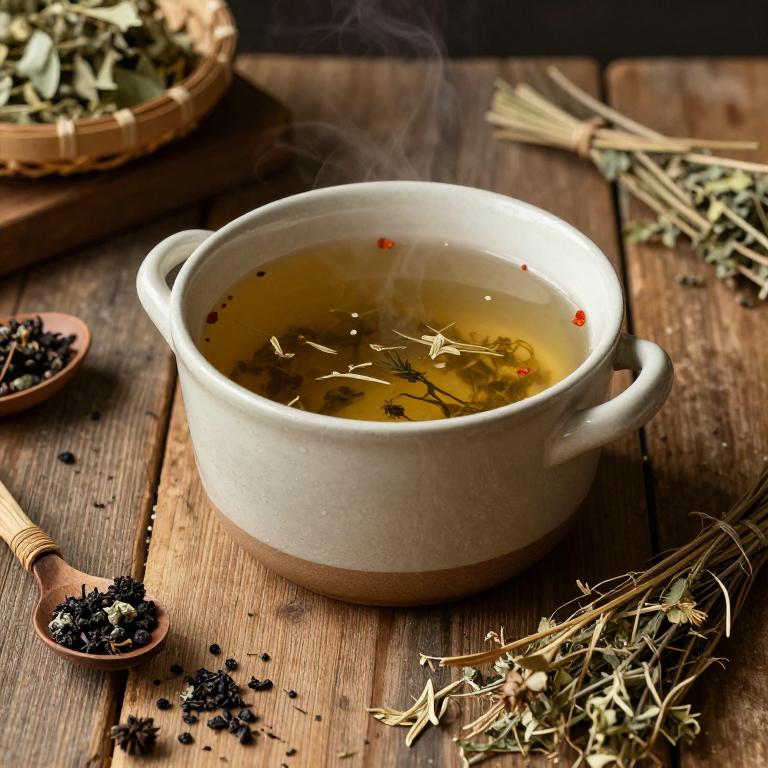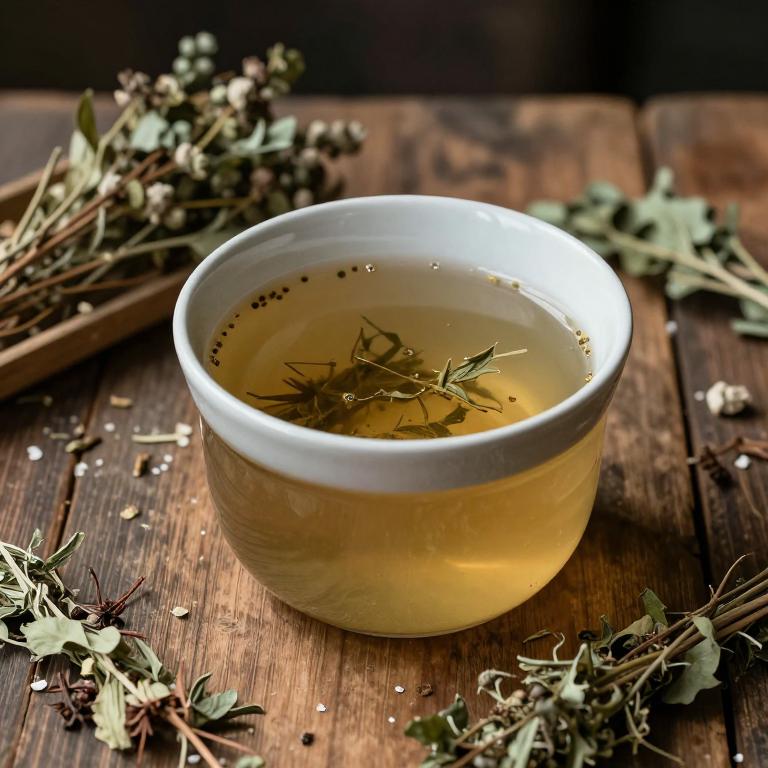10 Best Herbal Decoctions For Strep Throat

Herbal decoctions have been traditionally used to alleviate symptoms of strep throat by harnessing the anti-inflammatory and antimicrobial properties of various herbs.
Commonly used herbs include echinacea, goldenseal, and sage, which are believed to help reduce throat irritation and combat bacterial infections. To prepare a decoction, these herbs are typically simmered in water for an extended period to extract their active compounds. While some studies suggest that certain herbal remedies may offer mild relief, they should not replace prescribed antibiotics for bacterial infections like strep throat.
It is important to consult a healthcare provider before using herbal treatments, especially for persistent or severe symptoms.
Table of Contents
- 1. Thyme (Thymus vulgaris)
- 2. Licorice (Glycyrrhiza glabra)
- 3. Stinging nettle (Urtica dioica)
- 4. Ginger (Zingiber officinale)
- 5. Salvia (Salvia officinalis)
- 6. Echinacea (Echinacea purpurea)
- 7. Peppermint (Mentha piperita)
- 8. Black elderberry (Sambucus nigra)
- 9. Yarrow (Achillea millefolium)
- 10. Camellia (Camellia sinensis)
1. Thyme (Thymus vulgaris)

Thymus vulgaris, commonly known as thyme, has been traditionally used in herbal medicine for its antimicrobial and anti-inflammatory properties.
Herbal decoctions made from thyme leaves and flowers are often prepared by simmering the dried plant material in water for an extended period to extract its active compounds. These decoctions are believed to help alleviate symptoms of strep throat by reducing throat inflammation and fighting bacterial infection. The essential oils in thyme, particularly thymol, contribute to its antimicrobial effects, making it a popular natural remedy.
While thyme decoctions may offer relief, they should not replace professional medical treatment for strep throat, especially in severe cases.
2. Licorice (Glycyrrhiza glabra)

Glycyrrhiza glabra, commonly known as licorice root, has been traditionally used in herbal medicine for its soothing and anti-inflammatory properties.
When prepared as a decoction, licorice root can help alleviate symptoms of strep throat by reducing inflammation and irritation in the throat. The active compounds in licorice, such as glycyrrhizin and flavonoids, contribute to its antimicrobial and expectorant effects, which may help combat the bacterial infection causing strep throat. However, long-term use of licorice root decoctions should be approached with caution due to potential side effects like hypertension and electrolyte imbalances.
It is recommended to consult a healthcare provider before using licorice root as a treatment for strep throat, especially for individuals with pre-existing health conditions.
3. Stinging nettle (Urtica dioica)

Urtica dioica, commonly known as stinging nettle, has been traditionally used in herbal medicine for its anti-inflammatory and immune-boosting properties.
A decoction of stinging nettle can be prepared by simmering the dried leaves and stems in water for about 15 to 20 minutes, allowing the active compounds to infuse into the liquid. This herbal remedy is believed to support the body's natural defenses against infections, including strep throat, by reducing throat inflammation and soothing irritation. However, it is important to consult with a healthcare provider before using stinging nettle, as it may interact with certain medications or have side effects in some individuals.
While not a substitute for conventional treatment, urtica dioica decoctions may offer complementary relief for symptoms of strep throat when used under proper guidance.
4. Ginger (Zingiber officinale)

Zingiber officinale, commonly known as ginger, has been traditionally used in herbal medicine for its anti-inflammatory and antimicrobial properties.
When prepared as a herbal decoction, ginger can help alleviate symptoms of strep throat by reducing throat inflammation and soothing irritation. The active compounds in ginger, such as gingerol and shogaol, may inhibit the growth of bacteria and support the immune system. To prepare the decoction, fresh ginger root is sliced and boiled in water for several minutes, then strained and consumed warm.
While ginger can provide symptomatic relief, it should not replace conventional medical treatments for strep throat, especially in severe cases.
5. Salvia (Salvia officinalis)

Salvia officinalis, commonly known as sage, has been traditionally used in herbal medicine for its potential therapeutic effects on respiratory conditions, including strep throat.
Herbal decoctions made from sage leaves are often prepared by boiling the dried leaves in water to extract their beneficial compounds, such as flavonoids and essential oils. These decoctions may help reduce inflammation and soothe sore throats due to their antimicrobial and astringent properties. While sage is not a substitute for medical treatment of strep throat, some studies suggest it may provide symptomatic relief when used as a complementary therapy.
However, it is important to consult a healthcare professional before using sage or any herbal remedy, especially for bacterial infections like strep throat.
6. Echinacea (Echinacea purpurea)

Echinacea purpurea, commonly known as purple coneflower, is a popular herbal remedy often used to support the immune system.
Herbal decoctions of Echinacea purpurea involve boiling the dried roots, leaves, or flowers in water to extract its active compounds. Some studies suggest that echinacea may help reduce the severity and duration of colds and upper respiratory infections, including strep throat. However, scientific evidence on its effectiveness for strep throat specifically remains inconclusive.
While some people use echinacea as a complementary therapy, it should not replace conventional medical treatments for bacterial infections like strep throat.
7. Peppermint (Mentha piperita)

Mentha piperita, commonly known as peppermint, has been traditionally used in herbal medicine for its soothing and antimicrobial properties.
Peppermint herbal decoctions may help alleviate symptoms of strep throat by reducing inflammation and soothing irritated throat tissues. The menthol content in peppermint is known to provide a cooling effect that can ease discomfort and promote easier breathing. While not a substitute for medical treatment, peppermint decoctions may serve as a complementary remedy to support recovery.
However, individuals should consult a healthcare professional before using peppermint or any herbal remedy, especially if they have underlying health conditions or are taking medications.
8. Black elderberry (Sambucus nigra)

Sambucus nigra, commonly known as European elderberry, has been traditionally used in herbal medicine for its potential immune-boosting properties.
While it is not a primary treatment for strep throat, some herbal decoctions made from its berries and flowers may support the body's natural defenses against bacterial infections. These decoctions typically involve simmering dried elderberries in water to extract their active compounds, such as flavonoids and antioxidants. However, it is important to note that there is limited scientific evidence supporting the efficacy of sambucus nigra for treating strep throat specifically.
As with any herbal remedy, it should be used with caution and in consultation with a healthcare professional, especially for individuals with underlying health conditions or those taking other medications.
9. Yarrow (Achillea millefolium)

Achillea millefolium, commonly known as yarrow, has been traditionally used in herbal medicine for its anti-inflammatory and antimicrobial properties.
When prepared as a decoction, it involves simmering the dried herb in water to extract its active compounds, which may help reduce throat inflammation and soothe soreness. Some studies suggest that yarrow contains compounds like flavonoids and essential oils that could potentially inhibit bacterial growth, making it a possible complementary remedy for strep throat. However, it is important to note that while yarrow may offer some relief, it should not replace conventional medical treatments for strep throat, such as antibiotics.
Always consult a healthcare provider before using herbal remedies, especially for bacterial infections like strep throat.
10. Camellia (Camellia sinensis)

Camellia sinensis, commonly known as the plant from which green and black teas are derived, contains various bioactive compounds that may have antimicrobial properties beneficial for treating strep throat.
Herbal decoctions made from Camellia sinensis leaves can help soothe inflammation and reduce throat irritation due to their high concentration of polyphenols and antioxidants. Some studies suggest that the catechins found in these decoctions may inhibit the growth of Streptococcus pyogenes, the bacteria responsible for strep throat. While not a substitute for medical treatment, Camellia sinensis decoctions can be used as a complementary remedy to alleviate symptoms and support the immune system.
However, it is important to consult a healthcare provider before using such herbal remedies, especially for persistent or severe infections.